“Conciliation between Cairo and Tel Aviv was not Kissinger’s idea, besides he never expected the bold diplomatic move by Sadat whom he never took seriously. But all that was to change after the October war 1973″
Dr. Ashraf Ezzat
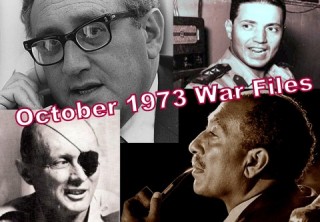 Anwar el-Sadat the former Egyptian president (1970-1981) who launched a daring military war against Israel to liberate the occupied land of the Sinai Peninsula in 1973, whose military commanders and valiant soldiers made an astonishing crossing of the Suez Canal and took over the impregnable Bar Lev line and who also surprised the whole world with his visit to Jerusalem in 1977 and later with his peace treaty with Israel in 1979 was not a hero of war and peace, as he is dubbed in Egypt, rather he was a conniver , a co-conspirator with the Americans and Israelis and a traitor to his Syrian allies and Arab friends.
Anwar el-Sadat the former Egyptian president (1970-1981) who launched a daring military war against Israel to liberate the occupied land of the Sinai Peninsula in 1973, whose military commanders and valiant soldiers made an astonishing crossing of the Suez Canal and took over the impregnable Bar Lev line and who also surprised the whole world with his visit to Jerusalem in 1977 and later with his peace treaty with Israel in 1979 was not a hero of war and peace, as he is dubbed in Egypt, rather he was a conniver , a co-conspirator with the Americans and Israelis and a traitor to his Syrian allies and Arab friends.
According to one of the most controversial articles that has been circulating the web since last February, president Sadat got into conspiracy with the Israelis, betrayed his ally Syria, condemned the Syrian army to destruction and Damascus to bombardment, allowed General Sharon’s tanks to cross without hindrance to the western bank of the Suez Canal, and actually planned a defeat of the Egyptian troops in the October War 1973.

- The author of that unsubstantiated article talks of some secret file, written by the Soviet Ambassador in Cairo at the early 1970s, Vladimir M. Vinogradov, apparently a draft for a memorandum addressed to the Soviet politbureau, describes the 1973 October War as a collusive enterprise between US, Egyptian and Israeli leaders and orchestrated by Henry Kissinger.
Though such a memorandum was never published by the former soviet ambassador nor confirmed by the Russian diplomatic circles, nevertheless, and for the sake of shedding more light on this highly important war, I thought we might delve into the historical records of the October 1973/ yum Kippur war and reexamine the chronicles of the ferocious three week- military confrontation between Egypt and Israel, and see if the alleged story of Mr. Vinogradov held any water.
October 6 /Yom Kippur War
The war was initiated by Egypt and Syria on Oct. 6, 1973, on the Jewish holy day of Yom Kippur and during Ramadan, the holy month of fasting in Islam, and continued until Oct. 25, 1973.
The war, which eventually drew both the United States and the Soviet Union into indirect confrontation in defense of their respective allies, was launched, above all by president Sadat, with the diplomatic aim of convincing a chastened—if still undefeated—Israel to negotiate on terms more favorable to the Arab countries and especially Egypt.
“It was aimed as a limited operation; the land was not my aim, at all. I wanted only to prove to the whole world that the Israeli theory of security would collapse and we could cross the Suez Canal and capture the Bar Lev line.” declared Sadat in a 1974 documentary by (abc)
I believe we should bear that goal of Sadat clearly in mind before we carry on with our reexamination of the October war for this rationale will help us understand some of the shadowy chronicles of the war.
Six-Day War 1967
The previous Arab-Israeli war, the Six-Day War (1967), was perhaps more than a just war for the Arabs and for Egyptians in particular. The 1967 defeat was so unexpected and bitter that the Egyptians dubbed it “Naksa” – the grave setback.
The withdrawal from Sinai in that humiliating manner has plunged the Egyptian nation and its army into a deep psychological trauma near to defeatism.
The most strategic outcomes of this war was not the land Israel grabbed over the six-day attack, rather it was the breakdown of president Nasser’s project of pan-Arabism along with his rejection to acknowledge the existence of Israel.
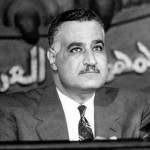
- The Arabs under Nasser’s leadership believed they could easily settle the conflict with Israel militarily. The 1967 war proved them wrong.
President Nasser was an outright socialist who made his opposition to the neo-imperialism represented in the United States and the neo-colonialism embodied by Israel no secret.
And since his popularity in the Arab world was indeed unprecedented and unshakable, the United States had to give credit to Israel for the eclipse of his glory in the Middle East. And from then on, Israel has touted its place as the indispensable ally of the United States in the Middle East.
When Sadat took over after Nasser died in 1970, he actually inherited a heavy burden. Egypt was a broken nation suffering from a failing economy, haunted by the shameful Naksa and aspiring to restore its pride by a military revenge no matter how long it took or how much sacrifices it required.
As 80% of Egypt military capability was destroyed in 1967, the Israelis, according to most military experts, agreed that Egypt would need at least another 10 years before it could engage in any military confrontation with Israel especially after Israel had fortified its positions in Sinai behind the infamously formidable Bar Lev line that stretched along the eastern coast of the Suez canal.
Unlike Nasser, Sadat despised socialism and in a way anticipated that the Soviets’ influence in the Middle East would recede, in that respect he was a true visionary, and he firmly believed that the United States, according to his own perspective, would want to step in and take the place of the Russians.
Sadat’s initiative
Embarking on his presidency, it didn’t take Sadat long before he managed to set his priorities straight. He knew he needed to get rid of the old guards of Nasser’s era, he knew he should begin weaning Egypt from relying solely on the Soviet Union and he wanted from his first day in office to, believe it or not, go to Israel and sign a peace treaty with the Jewish state. Watch Walter Cronkite, CBS anchorman, remembering Sadat’s early initiative.
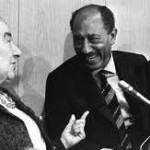
- Yes, shaking hands with the Israelis was Sadat’s own idea to spare Egypt long years of backbreaking military confrontations, restore the Egyptian sovereignty over Sinai and hopefully his opportunity to get into a new alliance with the white house.
In other words, the conciliation between Cairo and Tel Aviv was not the idea of Kissinger who never expected such a diplomatic move. Sadat for two years hoped that the white house would take notice of his new initiative by any means even if it meant sending a message with the American actress Shirley Temple when she was in Cairo 1972
Just as Nasser made no secret of his animosity to the Americans and the Israelis, Sadat was making it loud and clear from the very beginning, especially to the western main stream media, that he was embarking on a brand new path in the Arab-Israeli conflict and that the white house should take notice, for he really meant business.
But unfortunately, President Nixon never lent him enough attention and Kissinger himself, whom the alleged report accuse of choreographing the 1973 war, never took Sadat seriously and instead thought that he was just bluffing.
With diplomacy stalemated, during 1972 and 1973, Sadat’s decision to launch a joint attack with the Syrians on the Israeli forces occupying Sinai and the Golan heights was not based on merely retaliatory motives or only aimed at settling the score with the Israelis, rather it was his last resort to get the Israeli diplomacy into negotiating a withdrawal from Sinai under the auspices of the Americans.
The surprise of the October war
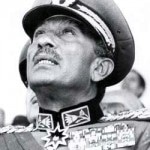
- The war began with a massive and astonishing Egyptian crossing of the Suez Canal during the first three days – according to the plan of Marshal Saad Shazly, Egypt’s chief of staff, after which the Egyptians dug in a territory (12 km deep east of Suez Canal) that was protected by the powerful Egyptian air defense (soviet SAM missile) umbrella and settled into a semi-stalemate.
On the other hand, the Syrians coordinated their attack on the Golan Heights to coincide with the Egyptian offensive and initially made threatening gains against the greatly outnumbered Israelis. Within a week and after the massive American airlift of reinforcement and resupply of munitions Israel recovered and launched a four-day counter-offensive, driving deep into Syria.
To relieve this pressure on the Syrian front and bending to the Syrians and Russians, the Egyptians went back on the offensive and operated outside the range of SAM missiles- so much to the furious opposition and dismay of marshal Shazly, and the Egyptian forces were decisively overpowered; an Israeli armored division then counterattacked at the gap between the second and third Egyptian armies headed by General Ariel Sharon, crossed the Suez Canal, and advanced southward and westward in over a week of heavy fighting.
On October 22 a United Nations-brokered ceasefire quickly unraveled, with each side blaming the other for the breach. By October 24, the Israelis had improved their positions considerably and completed their encirclement of Egypt’s Third Army.
This development led to tensions between the United States and the Soviet Union and consequently U.S. military raised their alert levels to DEFCON (Defense Condition) III. Eventually, a second ceasefire, closely monitored by Kissinger, was imposed cooperatively on October 25 to end the war.
Back to Vinogradov’s alleged memorandum. In conclusion, he asks some questions: how the Egyptian crossing of Suez Canal could be a surprise if the Russians evacuated their families a few days before the war? Why did the Egyptian forces not proceed after the crossing but stood still? Why did they have no plans for advancing? Why there was a forty km-wide unguarded gap between the 2d and the 3d armies, the gap that invited Sharon’s raid?
A military accomplishment and a prelude to peace
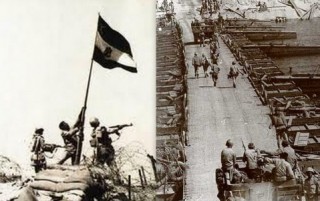
- The published memoirs of Marshal Saad Shazly along with the recently declassified U.S. archival material, unearthed by the National Security Archive, provide critically important information on policies, perceptions, and decisions of the parties involved in the October War 1973.
During the late winter and spring of 1973, Henry Kissinger held several secret meetings on Middle East issues in New York and France with Muhammad Hafez Ismail, Sadat’s national security adviser. In one of the meetings Kissinger told Ismail “don’t expect to win on the negotiating table what you lost on the battlefield.” In other words, Washington could do little to help as long as Egypt was the defeated power.
So according to Kissinger and considering the then stalemated status quo, Sadat had no alternative but to start a sudden and swift war with the element of deception/surprise as one of his most strategic tools for, if not winning the whole war, securing at least the first phase of crossing the Suez Canal into Sinai.
Document 7 of the declassified American national security archive stated “Neither Israeli nor U.S. intelligence recognized the imminence of war in early October 1973. AMAN, the Israeli military intelligence organization, and the leadership generally assumed that national military power would deter war and downplayed the possibility of conflict until 1975 when Egypt and Syria had better air capabilities. Moreover, Israeli military and political leaders had a condescending view of Arab fighting abilities”
During the weeks before the war, the Soviets believed that the situation was growing more dangerous, but like the Americans and the Israelis they did not see the resumption of fighting [as] at all likely. Yet, they had begun to evacuate dependents because they had learned of the decision for war, but not its exact timing.
A suspected Russian Intelligence Services (RIS, or KGB) official, Leo Yerdrashnikov (whose official cover was deputy director of the local Tass office in Cairo) also sheds light on when the Soviets learned of Sadat’s decision. On 3 October, Sadat told Soviet Ambassador Vladimir Vinogradov that war was imminent. Moscow did not, however, learn when the war would start until the morning of 6 October. (Note 19)
And as the Russians knew that the war was imminent, so did the Israelis whom were tipped off by an Egyptian Top Source (who may have been a double agent) Moreover, in late September Jordan’s King Hussein warned Prime Minister Golda Meir that Syrian forces were taking an “attack position.” These developments concerned the Israelis but AMAN ruled out major war.
The received wisdom in the American intelligence establishment was that the Arabs would not initiate war as long as the military balance favored Israel. In other words, Tel Aviv’s preponderant military power deterred war. This was the prevailing view of Israeli intelligence and U.S. intelligence bought into it. A few weeks later, Assistant Secretary of State Intelligence and Research Ray Cline observed, “Our difficulty was partly that we were brainwashed by the Israelis, who brainwashed themselves.” (Note 24)
As for the reluctance of the Egyptian army to advance deeper into Sinai after crossing the canal, it was simply, and according to Shazly’s plan (The High Minarets) a suicidal tactic to operate out of the cover range of the SAM anti-craft missile especially that the Israelis had the superiority in the air forces and outnumbered the Egyptian tanks on the ground.
And wasn’t it for the Syrians’ plea for the Soviet Union to interfere and urge Sadat to advance into Sinai, the Egyptian armored divisions wouldn’t have pressed on.
Sadat believed that, with the miraculous crossing of the Suez Canal and the seizing of Bar Lev line and the whole eastern coast of Sinai, he got all he ever needed to start maneuvering diplomatically. Debunking the Israeli invincibility, under the nose of the Americans, was indeed Sadat’s idea of winning the military conflict in October 1973
As for the gap that showed up in the Egyptian lines along the western side of the canal, a game changer in the war, was easily detected by the Israelis once the two armored units – the 4th&21st – were ordered by Sadat on October 12, to thrust deeper into Sinai and try to reach the strategic Mitla and Gidi Passes.
Expanding the military operations beyond the protective range of the SAM umbrella was absolutely a wrong military decision by Sadat. But I wouldn’t rule out the possibility that Kissinger and the Russians, trying to break the stalemate on the battlefield, influenced Sadat’s decision.
And while the Russians and the Americans helped Sadat to put an end to the October war, they both had no say in how or when it started. Let’s make no mistake about that.
[youtube mnTREuYAf9I Sadat and October 1973 War/ Edited by Ashraf Ezzat]
Almost 40 years have gone since October war during which the Israeli side got the security, the recognition and the peace they needed, while the Egyptian side got back all of its occupied land and above all restored the pride they lost in 1967.
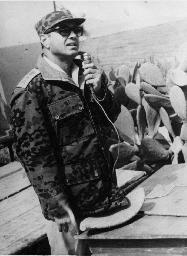
To most analysts and observers this sounds as a fair deal but actually it isn’t, not for many Egyptians any way.
And nobody could sum it up better than the man who fought the war himself, Marshal Saad Shazly.
Shazly looked back at how the October war started and how it ended up in a way that led to the Camp David treaty and eventually neutralized Egypt in the Arab-Israeli conflict, and concluded
“This brilliant military victory was turned into a political defeat, when Egypt was removed from the camp of resistance, to Israeli occupation of Arab lands to the camp of appeasement.
This shift in the balance of power in the region and the vacuum created by the absence of Egypt, allowed Israel to try to eliminate resisters one by one, starting with Lebanon, Iraq, Palestine and Lebanon again, Iraq again and now current rhetoric indicates that Iran and Syria are next.”

Ashraf Ezzat is an Egyptian born in Cairo and based in Alexandria. He graduated from the faculty of Medicine at Alexandria University.
Keen not to be entirely consumed by the medical profession, Dr. Ezzat invests a lot of his time in research and writing. History of the ancient Near East and of Ancient Egypt has long been an area of special interest to him.
In his writings, he approaches ancient history not as some tales from the remote times but as a causative factor in our existing life; and to him, it’s as relevant and vibrant as the current moment.
In his research and writings, Dr. Ezzat is always on a quest trying to find out why the ancient wisdom had been obstructed and ancient spirituality diminished whereas the Judeo-Christian teachings and faith took hold and prospered.
Dr. Ezzat has written extensively in Arabic tackling many issues and topics in the field of Egyptology and comparative religion. He is the author of Egypt knew no Pharaohs nor Israelites.
He writes regularly at many well-known online websites such as Dissident Voice and What Really Happened.
Dr. Ezzat is also an independent filmmaker. His debut film was back in 2011 The Annals of Egypt Revolution and in 2012 he made Tale of Osiris a short animation for children.
In 2013 his short The Pyramids: story of creation was screened at many international film festivals in Europe. And he is working now on his first documentary “Egypt knew no Pharaohs nor Israelites”.
ATTENTION READERS
We See The World From All Sides and Want YOU To Be Fully InformedIn fact, intentional disinformation is a disgraceful scourge in media today. So to assuage any possible errant incorrect information posted herein, we strongly encourage you to seek corroboration from other non-VT sources before forming an educated opinion.
About VT - Policies & Disclosures - Comment Policy




